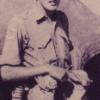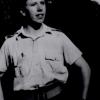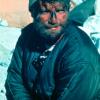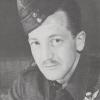Major Alan Bush (who died on March 3 1998, aged 83) was awarded an immediate MC at Arnhem during which he was wounded, taken prisoner, escaped, and rejoined his battalion. Given command of another battalion, he was wounded again, then finally succeeded in leading the remnants of his force back across the Rhine to safety.
Bush was wounded on the first day of the airborne operation, September 17 1944, and became separated from his unit. Next day he attempted to rejoin it but was taken prisoner. With great resourcefulness he managed to escape, and rejoined what was left of the division, which was still in action.
On September 22, he was given command of the 1st Parachute Brigade sector. So successful was his skill at organisation, that its front was never broken. On September 25, while leading a counter-attack, Bush was again wounded, but he continued to lead his men until the operation was completed. "Throughout, at great risk to himself," the citation for his MC recorded, "he constantly visited his men in every forward position, and his personal example was at all times heartening and inspiring."
Alan Bush was bom the youngest of nine children on July 18 1914 in Westmorland. He was educated at Heversham Grammar School and Queen's College, Oxford, where he read English and History, and was awarded a Rugby Blue in 1934. After leaving Oxford he taught at Mill Hill School until the outbreak of war, when he enlisted in the Coldstream Guards before being commissioned into the Border Regiment.
In spring 1941 he volunteered to join the recently formed Parachute Brigade, in which he was posted to the 3rd Battalion.
When the First Army landed in North Africa in November 1942 Bush parachuted into Bone with the 3rd Battalion, which subsequently fought as infantry during the remainder of the campaign. His principal memories were not so much of the fighting, in which the battalion distinguished itself, as of the cold relentless rain, the hostility of the local Arabs and the unfriendliness of the French.
In July 1943 he was parachuted into Sicily in a disastrous airborne assault which dropped many of the gliders and parachutists into the sea or into the wrong dropping zone (as happened to him).
After the Sicilian campaign, he landed with his battalion at Taranto in southern Italy and fought his way up the coast. He then returned to England to prepare for the North-West Europe campaign.
Eventually, after three months and 23 false starts, 1st Airborne saw action at Arnhem, the "Bridge Too Far" operation in which the lightly armed British Airborne Division found itself confronted by two Panzer divisions, four divisional battle groups and an infantry division. The outcome was that more than 1,000 British were killed, many more were isolated or wounded and taken prisoner, and some 2,000 of the original 10,000 managed, with great difficulty, to make their way back across the Rhine when the order was given to do so. But the Germans disclosed that their own casualties had been 3,300 killed and wounded.
It took Bush a long time to recover from his wounds, which, added to injuries sustained in North Africa, gave him severe problems for the rest of his life, though he made light of them.
After demobilisation he returned to Mill Hill, where he became a housemaster. In 1958 Bush was appointed Head Master of Merchiston Castle School, Edinburgh, from which he retired 10 years later. His foresight over financial investments during the sixties ensured the school flourished. After his retirement from Merchiston, Bush continued teaching for a while at Campbell College, Belfast.
Alan Bush was an inspiring leader, English teacher and rugby coach. He was a useful cricketer, an ardent letter writer, an excellent communicator at all levels; he was also a capable poet and author, and, above all, a man who in spite of the pain he suffered in his later years, managed to make others feel that life was fun. To his pupils he communicated the fact that English was something to be enjoyed, not merely a subject to be studied. He was also a talented musician with an excellent ear, able to play on a piano almost any tune he had heard.
Alan Bush was survived by his wife, Kate, two sons and a daughter.
Reproduced by kind permission of the Daily Telegraph
Read More




Latest Comments
There are currently no comments for this content.
Add Comment
In order to add comments you must be registered with ParaData.
If you are currently a ParaData member please login.
If you are not currently a ParaData member but wish to get involved please register.